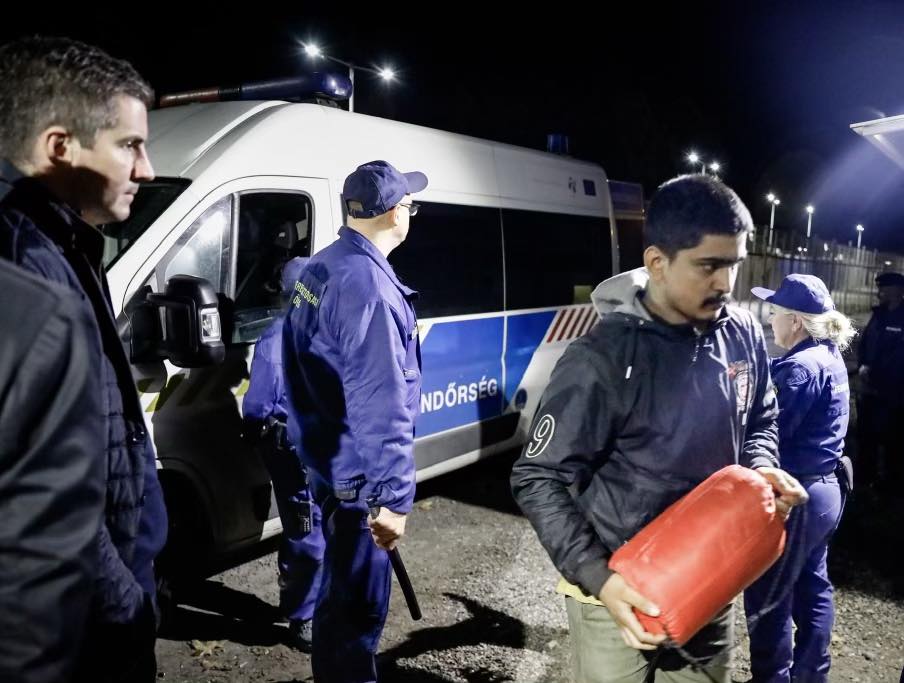Orbán cabinet promises wage hike amidst labour shortage crisis in Hungary’s education – UPDATED
The government is carrying on with its wage hike programme for teachers as it has promised, bringing teachers’ salaries to 80 percent of the average wage of degree holders, the head of the Prime Minister’s Office said on Thursday.
Government to carry on with teachers’ wage hike programme
Gergely Gulyás told a regular press briefing that the government meeting on Wednesday reviewed the situation of public education, ahead of the start of the new academic year.
With this year’s wage hikes, teachers’ wages have reached 670,000-680,000 forints, Gulyás said. That will be followed by a 21 percent raise on January 1, 2025, and the trend will continue until 2030, in line with the government’s pledge to keep teacher’s wages at least at 80 percent of the average salaries of degree holders, he added.
The average gross wage of degree holders is expected to be around monthly 1.25 million forints (EUR 3,180) in 2025, and teachers’ wages will be raised to 820,000 forints. “Very optimistic estimates” put teachers’ wages above 1 million forints by early 2027, he said.

Public education is of paramount importance for the future, including the prestige and financial appreciation of teachers, Gulyás said. “This is the profession that lays the foundation to the knowledge of future generations of their own homeland and the world around them,” he said.
Family support transferred early for start of school year
Government spokeswoman Eszter Vitályos said September’s family support and childcare benefits would be disbursed early this year in order to reduce parents’ burdens and help the start of the school year.
Vitalyás said the Hungarian Post will start delivering the payments on Friday and the State Treasury will start to make bank transfers on the same day. As a result, some 1,1 million families can receive the family support benefits ahead of the start of the school year.
The government will again provide free textbooks to all students in public education and vocational training, and through the local governments, free or low cost meals will be provided to students in large families and to families that raise disabled children.
Some 13 million text books and 70,000 other materials will be delivered to 4,100 schools, for 1,2 million children, she said.
Public schools have seen a substantial digital development in the past five years, with some 500,000 notebooks distributed to 5-12 graders, 200 smart text books were developed and students and teachers now have access to thousands of digital teaching materials, she said.
Class trips to Lake Balaton
Vitalyás said the school development of the past years had been “unprecedented”, with the development of 5,680 kindergartens and schools, and with 220 projects under way to construct swimming pools, gym halls and classrooms, as well as entire schools and one kindergarten.
Vitalyás said the state-funded Erzsébet camps were now operating year-round, and classes were able to organise school trips to Zánka, at Lake Balaton, in autumn, spring and the Advent season.

Meanwhile, older students now have access to funding for driving and language tests. Since its introduction in 2018, some 196,000 students have received support for driving tests, and 187,000 have been refunded for their successful language exams, Vitalyás said. The government has ploughed 4.9 billion and 6.5 billion forints into the two projects, respectively, she added. Courses for the driving exams have been free for students in public education since January 1, 2024, she said.
Further, the government is working to maintain and possibly expand family support. Tax cuts have left some 4,500 billion forints with families between 2011 and 2023, and under-25s are exempt from the personal income tax, she said.
Oil transit problems likely to be resolved
Gulyás said a solution appears to have been found for the problem of oil transits, with oil company Mol most likely able to sign the necessary agreements to ensure that crude oil transits through Ukraine to Hungary are not getting blocked.
“Technically, this will mean that even though the transport is more costly and Mol must bear risks from the Russia-Ukraine border, there is a legal solution that guarantee future” transits, he said.
He expressed hope that crude oil supplies will be secure in the long term on the route that is under threat in terms of transits.
Gulyás said it was regrettable that the European Commission had not taken action to protect the member states. “Despite this, I must say that it appears energy security can be guaranteed in the long term with the help of these agreements,” he added.
He said that neither Hungary nor Slovakia had received any form of support from Brussels.
Brussels failed to protect EU members, the Orbán cabinet believes
He added that Brussels had failed to protect EU members from the actions of a non-EU member that violated its accession agreement signed with the EU.
Gulyás said it was hoped that the solution would guarantee Hungary’s crude oil supplies and energy security in a period when a war is under way and energy acquisition and supplies belong among ther most important issues throughout Europe.
Meanwhile, the government had called on the justice minister to review possibilities to sue the European Commission for compensation for the costs Hungary had incurred due to migration, Gulyás said.
“We can say that Brussels is working to force us to allow migrants into the country,” Gergely Gulyás told a regular press conference.
Government mulling suing EU for compensation of migration costs
Hungary has also been fined for operating transit zones at the border, even as the new migration pact “has partially taken over those good Hungarian practices”, he said.
The protection of the Schengen Area’s external borders “is also a joint issue, not only Hungary’s, as it is important for the whole of Europe, rather than just protecting Hungary from migration.” At the same time, Hungary is being denied access to EU funding earmarked for border protection that is available for other countries, he said.

Gulyás said the interior and justice ministers were looking into “offering all migrants at the Hungarian border to transport them to Brussels, voluntarily and for free, adhering to European procedures”, should the EU continue to try to strong-arm Hungary into adopting regulations that would make it impossible to keep migrants away from the country.
“If Brussels wants migrants, it can get them,” he said and expressed hope that the lawsuit would result in forcing the EC to bear part of the burdens and sign a sensinble agreement as soon as possible to correct the “unacceptable, unbrearable and unfair” situation that results from a European Court decision.
If this does not succeed then “Hungary does not wish to pay daily fines endlessly” but will make it possible for those willing to get a one-way ticket to Brussels where “they can safely negotiate with the European Commission on the services they are to receive”.
Digital citizenship programme will be launched in September
Responding to questions, Gulyás said the European Commission had “no answer as to why they did not help with the blockade of crude deliveries”. As Ukraine is under attack, “the fashion in Europe these days is to stand by Ukraine,” he said. While that is understandable, “it is wrong and a mistake to think that Ukraine can do anything.”
Hungary’s digital citizenship programme will be launched in September and “will be fleshed out by next summer”, enabling Hungarians to conduct their affairs on the internet, “instead of the current complicated and out-of-touch state systems,” Gulyás said.
Asked about the state of Hungary’s budget, Gulyás said liquidity was ensured for “months, years”. He acknowledged that consumption had fallen behind expectations in the past few months, and said the bad economic environment in Europe, especially stagnation in Germany, was hobbling Hungarian growth. While the Hungarian economy is not growing at the expected pace, it will still be in the top third of European economies, he said. A 3.5-4 percent GDP growth is expected, he added.
Commenting on the arrest of the mayor of Budapest’s 3rd district on suspicion of graft, Gulyás said the scandal was further proof that “the left is riddled with corruption cases.” Noting that the nominating parties were standing by the mayor, who is now in pre-trial detention, Gulyás said those parties would have to ensure leadership in the district. For further developments, the procedure will have to be conducted “to see whether he can carry on leading the district,” he said.
Magyar was attempting to “smear the performance of health-care workers”
Commenting on remarks by Péter Magyar, the leader of the Tisza party, on the state of Hungary’s health-care system, Gulyás said that Magyar was attempting to “smear the performance of health-care workers.” He said those “working under such circumstances” deserved thanks, adding that it was a credit to the “resilience” of Hungarian health care that the extraordinary heat had led to a mere 5 thousandths of operations being postponed.
Gulyás said air conditioning was not effective in heats above 36 degrees Celsius as it could only reduce temperatures by 10 degrees. Since extreme temperatures were expected to become regular, the minister said hospitals needed special protocols to deal with the situation, noting that Mediterranean countries routinely rescheduled non-vital operations in extreme weather.
At the same time, Gulyás said hospital AC systems had been assessed and faulty equipment was being repaired or replaced, “although that doesn’t happen from one day to the other”. In other places, the hospital’s electric system could not cope with the increased demand, he said, but added that increasing the capacity of those systems would require “incredibly high sums”. The aim is to air condition all rooms where care is carried out, he added, however.
The government had ploughed significant funds into repairing and installing air conditioners in hospitals, and will continue to do so, Gulyás said. Health care remains a priority for the government, as mirrored in the wage hikes for doctors and nurses, and their increasing numbers, he said. The government paid all debts of Hungarian hospitals in June, and has allocated a 12.5 billion forint surplus to health-care spending to avoid further accumulation of debts, he added.
School-starter support
Gulyás said the government’s clearly expressed expectation was that when the world marker price of fuel drops, this should be reflected in domestic retail prices. There are various forms of intervention, “we prefer dialogue” which has been successful so far, he said. Asked why the 100,000 forint school-starter support granted to ethnic Hungarians beyond the borders was not extended to Hungarians at home, he said those with children in Hungary were already getting numerous forms of support and tax benefits, while those beyond the borders were getting “nothing”.
Commenting on claims that the state had bought three office buildings at excessive prices, he said it was the best solution to stop paying annual rent and instead move the state’s institutions to properties of its own. He added that an annual 60 billion forints was paid for rent, and by buying the buildings, this investment would return in 9-10 years. He also said that they were extremely energy efficient buildings that are suitable for special government demands. He added that he did not consider the purchase “a bad deal”.
Jobbik proposes 100,000 forints aid for each school starter
Ceasefire and peace talks
Commenting on the Ukraine-Russia conflict and the fights spreading over to Russian areas, Gulyás said the government’s position was unchanged in that ceasefire and peace talks were needed and all developments that go against this were disagreeable. He also said that the warring sides should handle all issues concerning energy security keeping in mind that they are not only disputes between them but matters that are important to the whole of Europe’s energy security.
Concerning plans for a fast railway link between the city and Ferihegy, he said the question is not whether this would be built, but when it would happen. If it is not connected to existing tracks, then implementation could take longer, around 4-5 years. A decision in the matter is expected this year, he added.
In response to a question, Gulyás said the explosions on the Nord Stream pipeline were acts of terrorism. “There are means that are unacceptable even if someone is under attack,” he added.
Ever since the start of the Russia-Ukraine war, Hungary understands that there is a risk that the operation of the Friendship Pipeline becomes impossible. It is partly why Hungary has such considerable reserves of natural gas and crude oil, unmateched by most European countries, he added. Gulyás said that “according to the current situation”, some 56 percent of annual consumption is ensured in the country.
Read also:
- Lukashenka sends his greetings to Orbán on State Foundation Day
- Tourists vs cities: Next clash in Budapest – mayor, government-close tourism board against Airbnb






Keeping teacher wages at 80% of graduate average pay is effectively no progress at all as this is the bare minimum and is nothing more than an inflationary increase. At this level it isn’t possible to recruit talented graduates when they can earn far more working for other employers (and yet more if they emigrate). The shortage of good (or any) recruits won’t be alleviated. Yet another reason that young people are deferring having children, perhaps permanently; they cannot house them nor do they have confidence that their children will receive a decent education when they’re older. It’s fantastically short sighted to starve education of funding when the entire future of the country rests on this bedrock and it impacts on the willigness of people to have children today.
Education opens MIRRORS and Windows of OPPOETUNITIES.
Orban, the Fidesz Government over the course of 15 years in Government, have DISMALLY failed to INVEST into Education.
Investment – it’s for the FUTURE of Hungary, creating OPPORTUNITIES for Hungarians, to be BETTER prepared in their lives, for what-ever that direction may be.
It was asked of me decades past by a law student of mine, in an open forum discussion :
“Professor, what did going to University – what did you really get out of it “?
My reply ;
It taught me to THINK.
Orban and his Fidesz Government – on the entire word of EDUCATION, are a cataclysmic DISASTER.
REMEMBER – they have NO money to INVEST.